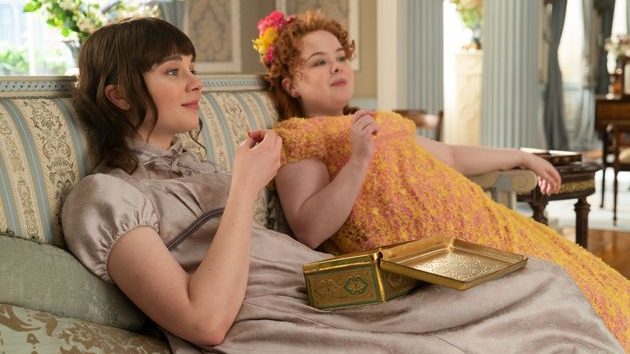As someone who can either take or leave a period drama, I was enthusiastic to find out which one of the many categories Bridgerton would fall into. Many people know iconic showrunner Shonda Rhimes for her work on cult classic shows like Grey’s Anatomy and Scandal. Bridgerton was created by Rhimes’ fellow producer Chris Van Dusen, who has previously worked on several of the iconic ‘Shondaland’ shows. This series is based on Julia Quinn’s run of novels, each which concerns a different member of the Bridgerton family.
The story revolves around the London social season that took place between April and late June during the 19th century. When women came of age, they were expected to have a ‘coming out’ where the would debut and be courted by suitors. This is such an intriguing construct, it surprised me that I had never heard of historical social seasons and hence made it interesting to learn about the conventions during this time, that are not regular settings for period pieces no less. This particular social season revolves around the eldest Bridgerton daughter, Daphne (Phoebe Dynevor), as she begins her journey to find a husband.
The writing on Bridgerton is exceptional and features new perspectives on Regency Era love. Daphne evolves significantly throughout the season, to a point where you really feel like you have watched a young woman blossom into an adult over the span of just a few months. There is a really powerful moment where Daphne confronts her mother about just how innocent and oblivious she left her as she went out into the world. It is so poignant to see her revolt against how women were expected to mature so quickly after being treated like children for their entire lives at that point in time.
Simon (Regé-Jean Page) is also a great character who remains an enigma until the very end. The story of his childhood is devastating and adds layers to who he exactly is and why he makes particular decisions. He and Daphne make for a complicated couple that keep you hooked on the plot as the intricacies of their relationship are slowly revealed.

I was worried that this would be a traditional regency romance that entailed marriages that were arranged to benefit social status, and Bridgerton does show how conventional this was at the time. The show explores the vast types of love such as the idea of a love match, which is mentioned on several occasions and refers to a marriage founded on real love and not love that comes after marriage or even marriages that are completely loveless. It uncovers the harsh pain of unrequited love and the elation of true love. However, at times Daphne and Simon’s journey can be quite tedious and gets repetitive, especially when intimate moments become overused and lose their emotional value.
When the trailer for this series came out, I was very compelled by the concept of Lady Whistledown, which is essentially an anonymous gossip column that seeks to expose all the juiciest secrets that emerge throughout the social season. This element of the story was heavily under utilized. At one specific point, the author reveals a secret that dismantles an impending relationship and sends families into disarray as they fear for their social statuses. This moment proves how this type of narrative creates such gripping tension and plot twists. It truly is exhilarating to see these events unravel, but it only really happens once and leaves you wanting more.
The writing team could have played so much more on the idea that Lady Whistledown was some ‘all seeing all hearing’ figure of the shadows who has more power to influence her readers and the reputable families than she did. Daphne’s younger sister Elouise (Claudia Jessie) is preoccupied with finding out who the author is and this could have been a very strong plot line as those scenes showed real potential but didn’t quite follow through which made Elouise, who is one of the most intriguing and unique characters in Bridgerton, feel very underused within the narrative.
The costume and production design on the show is stunning and elegant, providing true immersion into the time period that is a key aspect of the story. The music used during scenes at social functions was often violin covers of modern songs, which at times works well for the moment as it evokes a certain emotion that we can resonate with now. Unfortunately, at other times it becomes a distraction and I am here to inform you that Girls Like you by Maroon 5 works no better in a period drama as it does on the radio.
Performances were fantastic across the board. There are some that stand out, of course, such as the leads Phoebe Dynevor and Regé-Jean Page. Others include Nicola Coughlan who has strayed away from her hilarious performance as Clare in Derry Girls to play the naive and passionate Penelope, who has some great moments with Elouise as Claudia Jessie gives a remarkable performance in the time that she does have on screen.
After everything, Bridgerton is a much needed bit of escapism. It is quite addictive and I found myself wondering throughout my day how it would go and looked forward to settling down each time to watch. There is so much more to be explored in this series, 7 more books in fact, where we would get to delve deeper into characters that didn’t get the undivided attention they deserve in these 8 episodes. I, for one, will eagerly welcome an announcement of following seasons if there are to be any.
★★★★☆





